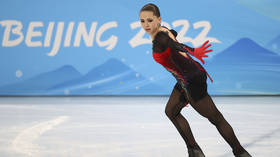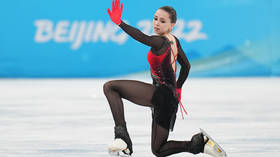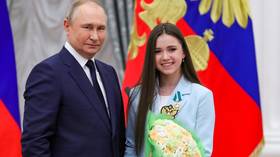Russian anti-doping chief outlines Valieva case conclusion

The Russian anti-doping authorities are targeting the end of September or the beginning of October for hearings into the case of Olympic figure skater Kamila Valieva, an official has said.
The Russian Anti-Doping Agency (RUSADA) confirmed on Wednesday that it had completed its investigation into the circumstances of Valieva’s positive test for banned heart drug trimetazidine – the news of which emerged during the Beijing Winter Olympics earlier this year.
RUSADA said documents were being prepared for a hearing of its Anti-doping Disciplinary Committee (DAK), and the organization’s general director, Veronika Loginova, has now indicated when those proceedings will take place.
“[On Wednesday] we completed the investigation. Now there will be a procedure for processing the results in accordance with international standards and requirements,” Loginova told TASS.
“We cannot give an exact date. Either the end of September or the beginning of October.”
RUSADA has been charged with carrying out the investigation after Valieva, 16, returned a positive test from a sample taken at the Russian National Championships in December.
The sample was analyzed at a laboratory accredited by the World Anti-Doping Agency (WADA) in Stockholm, Sweden, with the results only being announced around six weeks later.
By that time Valieva had already competed at the Beijing Games, helping her country to gold in the figure skating team event.
Despite the efforts of the International Olympic Committee (IOC), International Skating Union (ISU) and WADA to ban Valieva from the individual event in Beijing, she was cleared to compete by an emergency Court of Arbitration for Sport (CAS) panel.
Entering the competition as the red-hot favorite and world record points holder for her routines, Valieva – who was age 15 at the time – would go on to finish a disappointing fourth as the ordeal of her case took its toll.
Valieva and her team have denied any wrongdoing, and argued at their CAS hearing in Beijing that the positive sample may have come as a result of contamination from heart medication her grandfather was taking.
Scrutiny has fallen on Valieva’s coach, the renowned Eteri Tutberidze, although she has been vehemently defended by the skater herself and Russian sporting officials.
Questions have also been raised regarding the delays with the WADA laboratory in Sweden returning the results of the skater’s sample.
Valieva’s positive test meant that the medal ceremony for the team event in Beijing was canceled.
The US team which finished second and the Japanese bronze medal winners are still waiting to hear how Valieva’s case will affect their results.
The Canadian team which finished fourth could also stand to be elevated onto the podium, should Valieva and the Russian team be punished.
Speaking on Thursday, the CEO of the US Olympic and Paralympic Committee (USOPC), Sarah Hirshland, claimed it was “outrageous” that the case was still being resolved.
“I’d like to tell you that I’m less mad or less frustrated but it continues to be an outrageous situation,” said Hirshland in comments shared by Reuters.
“I understand that the investigation is complete, we saw yesterday an announcement that the hearings would be held.”
WADA president Witold Banka said in July that his organization was monitoring developments closely as RUSADA carried out its investigations.
“If we are not happy, we can always use the possibility to go directly to CAS,” said Banka.
Meanwhile, Valieva and her fellow Russian figure skaters such as Olympic champion Anna Shcherbakova and Olympic silver medalist Alexandra Trusova remain sidelined from international competition as a result of the ISU ban imposed because of the conflict in Ukraine.














